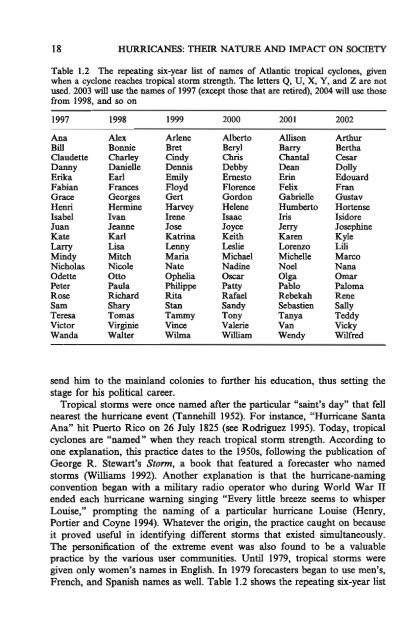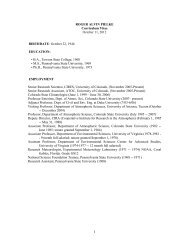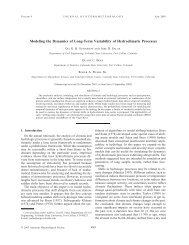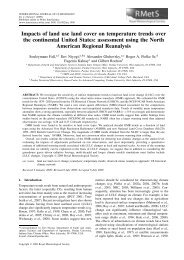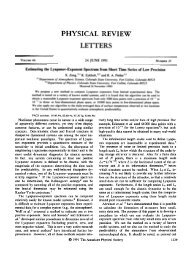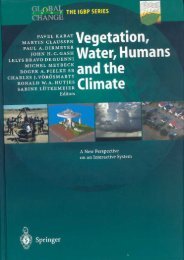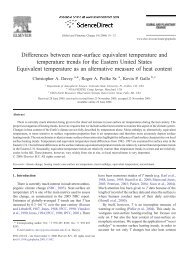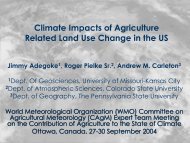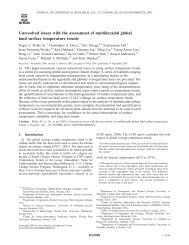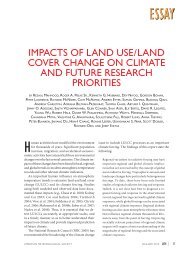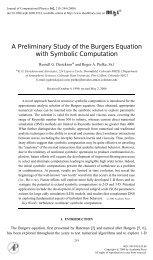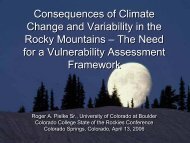Hurricanes: Their Nature and Impacts on Society - Climate Science ...
Hurricanes: Their Nature and Impacts on Society - Climate Science ...
Hurricanes: Their Nature and Impacts on Society - Climate Science ...
Create successful ePaper yourself
Turn your PDF publications into a flip-book with our unique Google optimized e-Paper software.
18 HURRICANES: THEIR NATURE AND IMPACT ON SOCIETY<br />
Table 1.2 The repeating six-year list of names of Atlantic tropical cycl<strong>on</strong>es, given<br />
when a cycl<strong>on</strong>e reaches tropical storm strength. The letters Q, U, X, Y, <str<strong>on</strong>g>and</str<strong>on</strong>g> Z are not<br />
used. 2003 will use the names of 1997 (except those that are retired), 2004 will use those<br />
from 1998, <str<strong>on</strong>g>and</str<strong>on</strong>g> so <strong>on</strong><br />
1997 1998<br />
Ana<br />
Bill<br />
Claudette<br />
Danny<br />
Erika<br />
Fabian<br />
Grace<br />
Henri<br />
Isabel<br />
Juan<br />
Kate<br />
Larry<br />
Mindy<br />
Nicholas<br />
Odette<br />
Peter<br />
Rose<br />
Sam<br />
Teresa<br />
Victor<br />
W<str<strong>on</strong>g>and</str<strong>on</strong>g>a<br />
Alex<br />
B<strong>on</strong>nie<br />
Charley<br />
Danielle<br />
Earl<br />
Frances<br />
Georges<br />
Hermine<br />
Ivan<br />
Jeanne<br />
Karl<br />
Lisa<br />
Mitch<br />
Nicole<br />
OUo<br />
Paula<br />
Richard<br />
Shary<br />
Tomas<br />
Virginie<br />
Walter<br />
1999 2000 2001 2002<br />
Arlene<br />
Bret<br />
Cindy<br />
Dennis<br />
Emily<br />
Floyd<br />
Gert<br />
Harvey<br />
Irene<br />
Jose<br />
Katrina<br />
Lenny<br />
Maria<br />
Nate<br />
Ophelia<br />
Philippe<br />
Rita<br />
Stan<br />
Tammy<br />
Vince<br />
Wilma<br />
Alberto<br />
Beryl<br />
Chris<br />
Debby<br />
Emesto<br />
Florence<br />
Gord<strong>on</strong><br />
Helene<br />
Isaac<br />
Joyce<br />
Keith<br />
Leslie<br />
Michael<br />
Nadine<br />
Oscar<br />
Patty<br />
Rafael<br />
S<str<strong>on</strong>g>and</str<strong>on</strong>g>y<br />
T<strong>on</strong>y<br />
Valerie<br />
William<br />
Allis<strong>on</strong><br />
Barry<br />
Chantal<br />
Dean<br />
Erin<br />
Felix<br />
Gabrielle<br />
Humberto<br />
Iris<br />
Jerry<br />
Karen<br />
Lorenzo<br />
Michelle<br />
Noel<br />
Olga<br />
Pablo<br />
Rebekah<br />
Sebastien<br />
Tanya<br />
Van<br />
Wendy<br />
Arthur<br />
Bertha<br />
Cesar<br />
Dolly<br />
Edouard<br />
Fran<br />
Gustav<br />
Hortense<br />
Isidore<br />
Josephine<br />
Kyle<br />
Lili<br />
Marco<br />
Nana<br />
Omar<br />
Paloma<br />
Rene<br />
Sally<br />
Teddy<br />
Vicky<br />
Wilfred<br />
send him to the mainl<str<strong>on</strong>g>and</str<strong>on</strong>g> col<strong>on</strong>ies to further his educati<strong>on</strong>, thus setting the<br />
stage for his political career.<br />
Tropical storms were <strong>on</strong>ce named after the particular "saint's day" that fell<br />
nearest the hurricane event (Tannehill 1952). For instance, "Hurricane Santa<br />
Ana" hit Puerto Rico <strong>on</strong> 26 July 1825 (see Rodriguez 1995). Today, tropical<br />
cycl<strong>on</strong>es are "named" when they reach tropical storm strength. According to<br />
<strong>on</strong>e explanati<strong>on</strong>, this practice dates to the 1950s, following the publicati<strong>on</strong> of<br />
George R. Stewart's Storm, a book that featured a forecaster who named<br />
storms (Williams 1992). Another explanati<strong>on</strong> is that the hurricane-naming<br />
c<strong>on</strong>venti<strong>on</strong> began with a military radio operator who during World War n<br />
ended each hurricane warning singing "Every little breeze seems to whisper<br />
Louise," prompting the naming of a particular hurricane Louise (Henry,<br />
Portier <str<strong>on</strong>g>and</str<strong>on</strong>g> Coyne 1994). Whatever the origin, the practice caught <strong>on</strong> because<br />
it proved useful in identifying different storms that existed simultaneously.<br />
The pers<strong>on</strong>ificati<strong>on</strong> of the extreme event was also found to be a valuable<br />
practice by the various user communities. Until 1979, tropical storms were<br />
given <strong>on</strong>ly women's names in English. In 1979 forecasters began to use men's,<br />
French, <str<strong>on</strong>g>and</str<strong>on</strong>g> Spanish names as well. Table 1.2 shows the repeating six-year list


